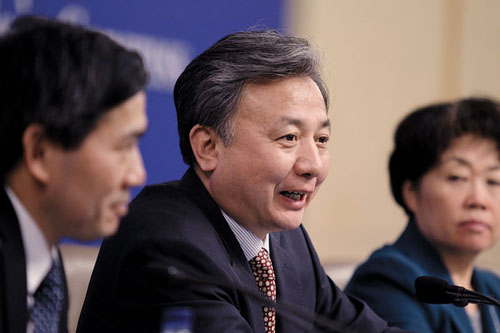
Lang Sheng speaks at a news conference on the work of the National People's Congress on Saturday at the 12th NPC at the Great Hall of the People in Beijing. Zhu Xingxin / China Daily
Re-education under microscope as China's legislators mull reforms
Government agencies have been tasked with looking into the reform of laojiao, the process of re-education through labor, and the findings may soon be released, a senior legislator said on Saturday.
As the country's top legislative body, this is the first response the National People's Congress has ever made to mounting calls to scrap this controversial penalty. Under current regulations, offenders can be confined for up to four years without coming to an open trial.
Lang Sheng, deputy director of the Legislative Affairs Commission of the NPC Standing Committee, said at a news conference that government organs related to the laojiao system are currently researching and preparing to push for reform in an active but safe manner.
"A reform is needed as times have changed. But to reform a system that has been implemented for so many decades, there is plenty of groundwork to be done," Lang said.
He admitted that the defects of the system are being exposed in tandem with an awakening of human rights and public consciousness to defend individual rights, but he said laojiao, or re-education through labor, has serves its purpose in its time.
Experts said the reform process could involve a re-division of power among relevant government agencies, such as the Ministry of Justice and the Ministry of Public Security, as well as a cleaning-up of laws and regulations that go against the reform.
Previously, the closed-door conference on national political and legal work had pledged to strictly control the use of laojiao until lawmakers can scrap the system entirely this year, according to Chen Jiping, deputy director of the China Law Society who was in the meeting.
Ending the system requires the approval of the country's top legislators, which originally endorsed laojiao in 1957, when they passed the proposal through the State Council.
Chen said the measure was effective when the Communist Party of China was consolidating the new republic and rectifying social order, but now China has well-established legal systems and has alternative means of punishment, such as community correction.
Fu Lijuan, deputy director of the Justice Department in Hunan province, agreed that the reform was imperative, but suggested local conditions be taken into consideration.
The legitimacy of laojiao has been the subject of wide public speculation since several disputed cases came to public attention last year.
A high-profile case in Hunan province was Tang Hui, the mother of a rape victim, who was sentenced to laojiao last summer for repeatedly petitioning the authorities.
Tang was sentenced to 18 months laojiao by the city of Yongzhou in August after she demanded death penalties for all seven men convicted of abducting, raping and forcing her then 11-year-old daughter into prostitution.
She had accused two police officers in Yongzhou for taking part in raping her daughter, and forcing the girl into prostitution, but they were not convicted.
The 40-year-old mother was released within a week after the case caused public outrage. It also prompted the Political and Legal Affairs Committee of the Party's Hunan committee to re-investigate the case in January.
Wei Xuanjun, the mayor of Yongzhou, said investigation was in progress and declined to reveal more.
Hu Xuxi, deputy director of the Public Security Department in Hunan, told local newspaper Xiaoxiang Morning Herald that the province has not approved new laojiao cases for a while, but it has not officially abolished the use of it.
At Saturday's news conference, Lang also said the plan to draft a law on education and correction of illegal acts, meant to better safeguard the legal rights of laojiao inmates, may be adjusted.
He said a legislative plan put to the NPC was to solve existing problems of the laojiao system, and since the reform of laojiao is now on the official agenda, the drafting of the law would be reconsidered.
Read more:

Copyright ©1999-2011 Chinanews.com. All rights reserved.
Reproduction in whole or in part without permission is prohibited.